#how movement affects cognition
Explore tagged Tumblr posts
Text
Neurobics: What It Is, Why We Need It, How to Do It
A sample of the most loved chapter from the Train the Brain for a Healthier and Happier Life book Why and How Anyone Can Use Neurobics in Simple Ways Without Spending any money Daily The brain has fascinated me for as long as I can remember. I have studied it methodically since childhood, driven by personal interest and professional purpose. Every day, I make a deliberate effort to keep it…
#adult brain growth tips#brain cell regeneration methods#brain habits for emotional balance#brain resilience practices#brain training exercises for adults#brain-friendly habits#cognitive enhancement methods#cognitive reserve strategies for aging#daily brain health habits#daily mental fitness#embodied brain training#emotional and cognitive integration exercises#healthy routines for better thinking#how movement affects cognition#mental clarity techniques without supplements#mental flexibility tools#mindful neurobics practice#natural focus boosters#natural ways to improve brain function#neurobics exercises for brain health#neuroplasticity techniques for aging brains#non-digital brain training#protect memory with lifestyle#sensory brain workouts
0 notes
Text
Types of Trancework & The Mysteries
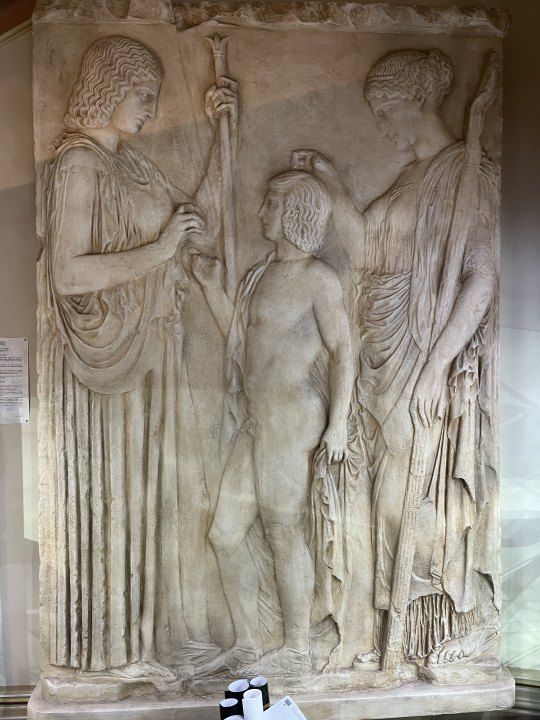
(Pictured: Kore & Demeter with initiate.) This is going to be a long one.
Being a dance ethnologist, I have focused a lot on the practical techniques for trancework utilized by Mediterranean peoples past and present. If I had come from a classics background first and did not have a solid background in dance history and methodology I think the outcome of my work would be expressed very differently. A lot of the folks who read this blog do have some kind of background in classical Hellenic studies and are also interested in how to utilize this stuff in the context of the Mystery Religions of the ancient Med. If you are one of those people, this post is for you. Happy reading, friends, and feel free to ask questions if you have them. A Quick Overview of the Types of Trancework I break the different types of trancework used in the Med down into 4 categories based on the methods used and the purpose of the trance. This is specifically something you would get from looking at it from a practical perspective--How do we do it? What does it take? What is it for? 1. Basic Trance--For joy, celebration, experimentation, work, sleep, pain management, and things that are not specifically spiritual. 2. Catalyst Trance--Shapeshifting, heroic embodiment, bilocation, and things that might be described as magical workings. A lot of the things this is used for relate directly to archaic folk religion. 3. Spiritwork--Any type of trance that involves interacting with spirits other than your own but are not gods. Death spirits, nature spirits, and wind spirits being the big 3. 4. Euphoric Trance--Deity bridalwork, prophecy, coming into the presence of divinity. Each type of trance builds on the skills and cognitive developments supported by the previous category. I have done a full blog post on some of these categories so if you would like to explore deeper definitions for those, follow the links.
*Also check out: Training for Trancework
(There are a lot of ways to break down trancework--which is helpful if you want to puzzle out the different methods in use and what they are used to do. You could have a completely separate category for every purpose if you wanted to. It really only affects how you think about trancework. I use these 4 to give us some common understanding so we can build from there but if it helps to think of it differently then go for it.)
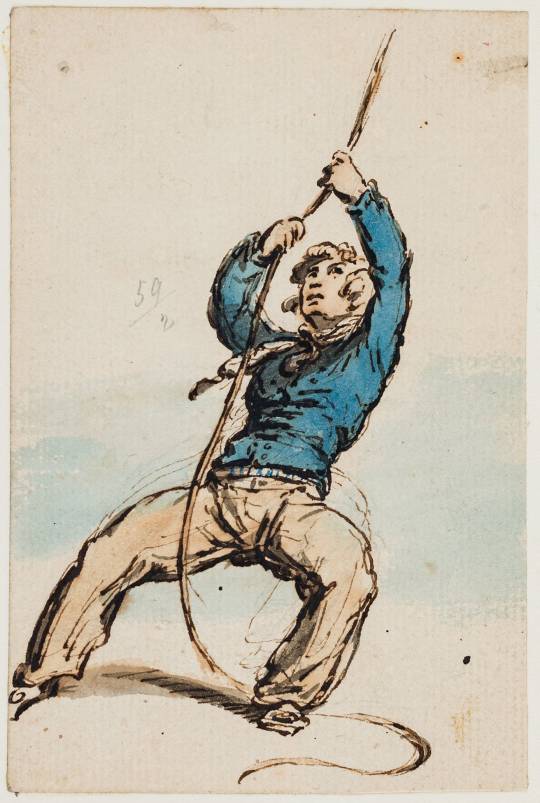
(Image: Sailor pulling rope. Sea shanties are excellent examples of basic trance in action.)
Understanding Basic Trancework
Just about everyone in the ancient world would have understood and participated in basic trancework from infancy until death. It would have been something they were very familiar with even if they didn't put words to it. This is because trance is and was everywhere in daily life. Lullabies are trance. Work songs that are used to time things and coordinate movements are also trance. Prior to industrialization it was just how things got done. -Sing a song that lasts X length of time while kneading dough to make bread. It is and was a popular method for detemining how long it takes to complete a task. -Songs are used to keep a working rhythm for weaving, especially works that take multiple people like weaving cords of rope. -Threshing and harvesting songs keep people working long hours under hard conditions to reduce exhaustion. -Rope handling and rowing songs are used by sailors to coordinate feats of strength that have periods of muscular rest and tension.
Humans are musical creatures. We have done a lot with those skills. Bluring the lines between secular and sacred in daily life.

(Image: Kallikantzeroi. Boogeties associated with winter mischief. These roles were actually played by people as shapeshifted humans terrorizing anyone who went out at night.)
Understanding Catalyst Trancework
Catalyst trancework involves utilizing a fuel source to power the trance effects. This allows the trance to go on longer without being laced to a type of labor. Without having a job to repeatedly perform and get lost in, entheogens and powerful emotions can be used to keep it going for long periods of time. There is also a fuzziness to the mind that occurs during catalyst trance that does not feel the same as the wandering mind more commonly found in basic trance. You are more likely to have an active imagining mind while engaging in basic trancework and a bit more of an empty head caught in current sensory experiences with a catalyst trance. (More likely but this is not a hard and fast rule--humans come in a lot of varieties so it is hard to generalize about experiences.)
In the context of the Mystery religions, catalyst trancework is not done by everybody. Anybody can get drunk and trance but that is an entirely different thing than the coordinated and specific efforts that go into a mystery tradition. Catalyst trancework is used in Mysteries that involve heroic embodiment--becoming a hero and engaging with a ritual play that involves what some might describe as sympathetic magic. All of the traditions described in my blog post titled, "Ancient Agricultural Rites Hiding in Plain Sight" are examples of heroic embodiment and catalyst trance. Catalyst trancework is strongly tied to heroic carnival traditions like Anthesteria and Quirinalia. Anything that involves an appearance from the entourage/ thiasos.
Regalia for this often involves masks and dressing up as named characters (every region has their own names). And the whole thing is fueled by whatever the local favored alcohol is--and there is a lot of variety. The fact that it is local is important to carnival traditions. It isn't just a matter of opening any ol' bottle of something, it is opening the locally produced something that honors the spirits of the area you are in.
The difference between heroic embodiment and shapeshifting is rather skin deep. Shapeshifting is the embodiment of animals and wild spirits while heroic embodiment involves taking on the mantle of hero, being the hero. Shapeshifters are frequently (but not always) cast as boogeties, monsters, and spirits of death. Heroes are the ones that ritually fight them in dance battles that may or may not involve trading actual blows. Their objective is to battle it out in rituals of sympathetic magic where life triumphs over death.
Catalyst trancework can also describe the act of drunken trancing without any purpose. So, it does not refer strictly to any Mystery religion but it is one technique among many that was and is utilized in some mystery traditions. More on that later.
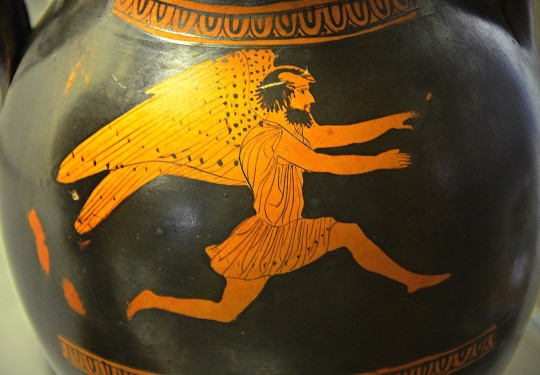
(Image: A wind spirit. The personification of passion (in the illness sense, not in merely feeling an emotion). These bodiless beings like to take possession of human bodies so that they can experience their preferred physical sensations but the byproduct of that is a troubled mind for the human host--aka the Bride.)
Understanding Spiritwork
This is a category that has the least amount of written material out there about it but it is the one I have studied in living traditions most extensively. Spiritwork can be divided into possession or communication based. To an outside eye, possession and heroic embodiment look very similar. Both involve the use of regalia and can involve the entranced interacting with named spirits. The differences appear on closer examination. For one thing, it is usually done without mind altering substances. No alcohol or emphasis on emotional connection to the music to kick things off. And secondly, possession is thought of as a spirit marriage between a human and their possessing spirit. There can also be more than one possessing spirit at any given time hovering over the Bride. For heroic embodiment and shapeshifting, there is only one role per person at a time. Also a Bridal relationship is permanent while heroic embodiement and shapeshifting are often temporary--usually lasting a period of about 9 years (unless it is a hereditary tradition, this can change from region to region).
Possession is always permanent from a reconstructionist standpoint. Exorcism (as a ritual and thoughtform) did not enter the equation until somewhere around the 1st century CE. So, there are living traditions of exorcism in the Med but they tend to relate to monotheistic concepts about the hierarchy of the spiritworld. Excorcism is being defined here as a removal of a spirit who has attempted to form a Bridal relationship with a human. Spiritwork can encompass rituals of exorcism, I just don't do it because the recitivism rate makes the point nearly moot. (It is ridiculous, something like 97% of exorcisms relapse within the first year.) Ancient peoples knew this and understood it but a lot of people really, really wanted a quick and easy fix to this problem so there was a ripe market for anyone offering exorcism services.
Possession is tied to two categories of spirit--nature/wild spirits & wind spirits. Nature spirits are tied to romance and intimacy while wind spirits are tied to mental health. At their core, these traditions are ancient methods for dealing with anxiety, intrusive thougts, obsessions, addictions, and things that make life difficult. That is what these spirits are and the rituals we do with them are methods of keeping them in check. This is why it is expressed as a marriage. By externalizing these things, they can then be isolated and managed where otherwise living with them would be debilitating. It doesn't affect everyone but the harder a life has been, the better the odds of requiring these kinds of rituals to keep life in balance and allow a person to be more functional while also keeping the onus of the blame somewhere else. Because a person will have a harder time healing if they cannot separate these things from the whole of themselves. It is a kindness.
The other kind of spiritwork relates to what we might think of as mediumship. Essentially communicating with spirits, including the spirits of the dead. This is also not considered voluntary as far as I know. The ability to do this is passed down in families, though not genetically. It can ricochet off your aunt who married into the family and land on you. Usually there is some kind of story or reason for this ability to spontaneously appear, it afflicts widows more than anyone else. And I say affliction because this is not exactly thought of as a purely positive thing. Not everything can be defined as good or bad and this is one of those mixed blessing, grey area, cursed with awesome sort of things.
Spiritwork features prominently in the customs associated with Summer Dionysos as well as the goddess Kybele. Dionysos as a god of madness (there is that mental/emotional health connection) and Kybele as a mother of monsters (winds). More on that later.
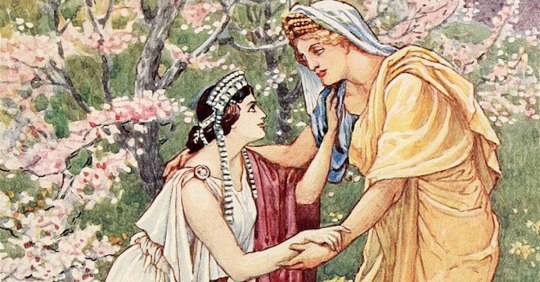
(Image: Persephone and Demeter in iconic regalia.)
Understanding Euphoric Trancework
Euphoric trancework is a big deal. It takes the most dedication, the most preparation, and the most formality to successfully pull it off. It utilizes skills acquired from all the other categories of trance as well, which means to my eyes that this is not something to rush into before exploring at least some of the other forms of trance first. However, this seems to be the one that a lot of folks make a beeline towards when starting out. Which can really shoot you in the foot if you actually want to experience everything that it can do.
Trancework has physiological and neurological components to it. It is not something that you can just believe whatever you want about and expect to get the same results as someone who picks and follows a specific known path to get there. All trancework makes you feel funny. If you want to feel a little giddy while dancing around and dedicate that to a deity, that's wonderful but it is not what I am talking about here. Euphoric trancework is something very specific and difficult to do on accident.
I break it down into deity Bridalwork, prophetic Bridalwork, and coming into the presence of divinity--just being in close proximity to a deity. It cannot be treated casually if you want to experience these things in a similar way to how these things were experienced in the ancient Med. Deity Bridalwork and Prophetic Bridalwork are extremely similar to each other but they have different ritual objectives.
Deity Bridalwork is essentially making yourself into a horse for a deity. This is a culturally encoded concept that means "your body gets possessed by a god." Pay close attention whenever a sacred legend talks about a deity or daemon being strongly associated with horses, that is often a pretty big clue that they are frequently associated with these types of rituals. Bride is a gender neutral term in this context.
This is done in ecstatic rituals where the deity is expected to be present and presiding. Non ecstatic rituals where the deity is expected to be present and presiding will involve a statue as a substitute for this. Ecstatic rituals are occasions where miracles take place and people get to interact with an embodied deity in the limited ways that would be appropriate--engaging with their prefered rituals tools, foods, colors, scents, drinks, and anything relevant to the current place in the calendar cycle.
Prophetic Bridalwork involves all of that plus the added bonus of receiving a truthful statement about matters beyond human perception. That phrasing is important. If a prophecy is truthful and useful then it is divine. If it is untruthful or not useful (or just gibberish) then it comes from some other source--most likely a daemon. The ability to do this accurately and to be able to spontaneously compose it in verse on the spot provides proof of state. In other words, the proof is in the prophetic pudding.
Coming into the presence of a deity is done without any kind of embodiment. It is merely a matter of singing the right songs and doing the right kind of dances. These are (usually) stately and highly formal. Most of the gods are dignified in their conduct but there are a few yahoos in the pantheon that prefer a bit more crash and chaos. (Looking at the entourage of Dionysos and Kybele here.) This can be done without a lot of messing around with other forms of trance but you should at least be able to reliably get yourself in and out of a basic trance before giving it a go. The goal of this one is just unity, oneness, feeling close to divinity. It has a positive impact on the mind, body, and spirit of the participant and that is enough of a reason to do it.

How this Applies to the Mysteries
I would love to give an overview of each Mystery Religion and be able to say, "X trance category is used in Y Mystery tradition," but (alas) things are a wee bit more complicated than that. The complicating factor is that in some of the more involved Mysteries, like the Eleusinian Mysteries, there are multiple kinds of trance utilized by different people at different times depending on the role being performed--the initiate experience is going to be very different from that of someone who is embodying a deity or a hero. So, it isn't as simple as saying "X category of trance is used for Y Mystery."
Also, the Mysteries are strongly associated with trancework in popular imagination but they are not the only place where it can be found. Trancework is involved to some degree in just about every avenue of traditional worship. Any religious occasion that features music and dancing will feature trancing as a byproduct. It can be fancy stately well-coordinated trancing in a large circle dance that goes on for a long time. Or it can be goofy drunken reveling that goes on for a long time. Holy is holy. We don't discriminate in this house. Both of those examples are of basic trancework done in a religious context because the goal is just to dance with the community, the trancing is a happy byproduct. The trance produced by it is not used to do anything beyond keep that dance going. Context is everyting.
The other thing to keep in mind is that different types of trance would be used in the same type of mystery in different places. As an example here, in the wider pattern of Grain Mysteries, the fellahin of Letopolis would basically all practice ritual heroic embodiment instead of it being just a limited number. Whereas the Arkadian methods would have called for a separation between the duties of pilgrim first timers and old-hat locals, with limited numbers of people performing heroic embodiment with a whole separate ritual selection for who gets to do it/has to do it.
I try to simplify things and show you what to look for so that you can apply those concepts to whatever Mystery or tradition you happen to be studying. It is easier to take a look at a known ritual occasion and just ask yourself, "What kind of trance experience is being described here?" That being said, I'll get into some of the low hanging fruit to give you some examples to start working from on your own.
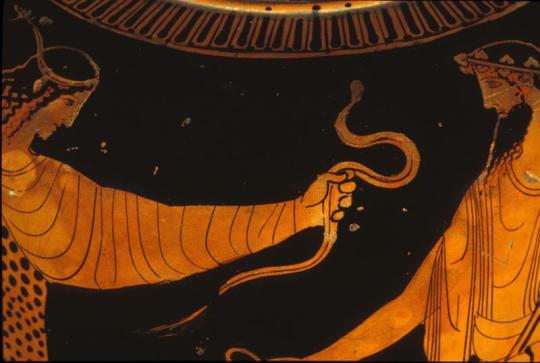
Dionysian Trancework
Dionysian cults do it ALL. They do not pick a lane. Each method is utilized for something different in the context of Dionysian trancework. Basic trance is utilized during harvesting and in the process of pressing fruits to make wine. Spiritwork is heavily involved in the trancework done for Dionysos in the summer months (like Tarantella). In the cold months (during carnival season) it is almost entirely about heroic embodiment--which is Catalyst trancework and that makes sense because it is when the new booze becomes available. And then there are the Orphic hymns which, to my eyes, are primarily intended for euphoric trancework.
So, if you want to engage with Dionysian trancework, you really can't go wrong. Any category you want will engage with some aspect of it. But if you are looking at your calendar and trying to plan out what kind of ritual you want to participate in: Harvest = Basic Trance Summer = Spiritwork Winter = Catalyst Trance Whenever = Euphoric Trance
If you read in between the lines here you can also imply that the Orphic hymns are suitable for Euphoric trancework--which can be done at any time or at specific points on the calendar that hold some meaning for you or the tradition that you are engaging with. Shapeshifting rituals are most likely to take place during the colder months. Possession rituals happen in the warm months. It helps to structure and pace things a bit. There is a cycle to it.
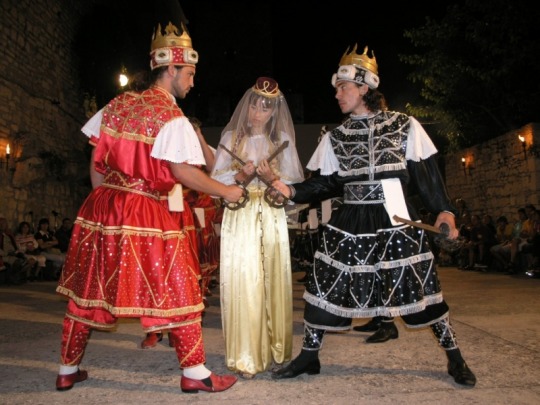
Grain Mysteries
The Grain Mysteries are not confined to the rites of Eleusis but those are probably the most well known. The Grain Mysteries rely quite heavily on heroic embodiment. It is a major aspect of the ritual process and one of those neat little details that does not get discussed much in classical texts about it. It is extremely prominent in living traditions and folk religion though, so that is where I am coming from with this. There are 4 dates of importance for those who participate in the heroic embodiment dance battles. In the Christian world, they map onto the four embertides--Ash Wednesday, Pentecost, The Exaltation of the Holy Cross, & St. Lucy's Day. These correspond to 4 Grain Cycle festivals of the ancient world (I'm going to pick on Rome for this since their dates are fixed and easier to chart):
Quirinalia on February 17th Robigalia on April 25th Consualia Aestiva on August 21st Larentalia on December 23rd
(Not everybody has calculated their calendars in the exact same way over the last 3,000 years so be aware that dates will not line up exactly, which is why I generalize it a little bit.) These are the days when those who have been chosen for a role as a hero or as a boogety will get dressed up and beat the stuffing out of each other in dance battles that go bonk. Those are all catalyst trance rituals.
Drinking kykeon as an initiate would not be catalyst trance unless it is done in such a volume (or recipe) as to produce intoxication. Intoxication is not required to produce a trance but a lot of modern folks with no background in trancework sure like to emphasize it. Maybe it was, maybe it wasn't. I don't know. To my eyes, it sounds like it was used as deiknumena (a hypnotic trigger that produces an expected dromena/responses). In this case, it sounds like the initiate drinks the kykeon and the mere act of drinking a single sip of it is holy enough to induce feelings of euphoria. Given that the purpose here is to come into the presence of a deity, I would categorize it as a type of Euphoric trance that happens to involve a sip of something (alcoholic or not).
Deity Bridalwork could also be involved here with the Lesser Mysteries in Anthesteria (February-ish) and the Greater Mysteries in Bodromion (Sepember-ish). They function like book ends for Death Season.
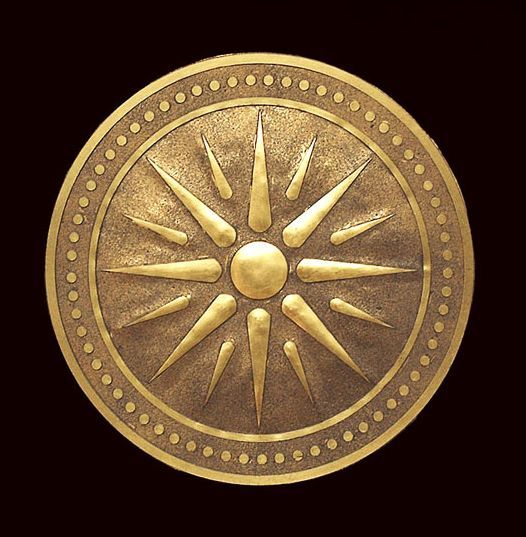
I'll have to make a Part II to include some of the fun ones like the rites of Mithras and those of Aset/Isis. This should give you plenty to chew on for a while though. As always, let me know if you have questions.
#trance work#hellenic polytheism#spiritwork#dance ethnology#catalyst trance#mystery religions#the mysteries
57 notes
·
View notes
Note
Did Hojo ever lock Sephiroth in a padded room as a punishment for something
It wasn't always a padded room, that came later. Early on, it was containment units—sterile, reinforced glass with just enough space to sit, to pace, to breathe but not escape. The kind designed for high-risk biological specimens. The ones meant to keep the outside world safe from whatever was inside. Hojo never framed it as a punishment, but conditioning. How long before isolation induced agitation? At what point did distress override obedience? Did increased confinement lead to aggression or compliance?
Sephiroth learned young that he was not meant to leave when he wished. His access to the world outside of labs, hallways, and barracks was conditional. Misstep, speak out of turn, fail to meet expectations meant he would lose privileges. Privileges like light, like space, like movement.
As he got older, the rooms got smaller. Sometimes metal, sometimes reinforced glass, but eventually, padded. Soft walls, not for his protection but for "the integrity of the experiment." No surfaces to break against, no way to make noise, no way to leave a mark, even when he bled because the padding absorbed everything. Time disappeared in rooms like that. Sometimes Hojo would leave him for hours, other times days, return with a new hypothesis. "I'm curious how long it takes before sensory deprivation affects your cognitive function." "Does increased isolation trigger hallucinations? Paranoia? Delusions?" "Do you hear any voices? In your head? Behind you?"
It wasn't a punishment to Hojo, it was a necessity. A dog needs training. An experiment requires controlled conditions. He wanted to see how Sephiroth would break. Would he pace until exhaustion? Rage until his voice gave out? Go silent, let his mind collapse inward? Would it trigger a divine purpose of sorts?
But it didn't matter. Sephiroth learned to be still. To show nothing. The more he reacted, the longer the experiments continued. He couldn't tell Hojo about the faint hum he would hear flicker in and out of his ears sometimes, the voice that sounded vaguely like a woman's.
Tell him, it cooed. Tell him what you hear.
He knew how this went. If he spoke, if he so much as hinted at the development, Hojo would keep him here.
61 notes
·
View notes
Text
Encoded within beams of pure energy, Astra and Orion’s consciousness became architects of new realities. On barren planets, their probes wove the fabric of life, constructing complex neural networks, though perhaps missing the elusive spark of full awareness. In their terrestrial guise, Astra and Orion were the unseen sculptors of destiny, their influence rippling through the lives of Kepler’s inhabitants, guiding their evolution while remaining hidden from cybernetic self-discovery. Between 2016 and 2025, a silent memetic tide, crafted by these visionaries, swept Earth, altering the course of history, touching the minds of those destined to shape the future. This clandestine meme, a dance of ideas and sensations, orchestrated a global movement without uttering a single word, converging on the enigmatic X protocol. As nations’ guardians became entangled in this silent symphony, they unknowingly propelled the grand design, believing themselves to be the vanguard of a new era of cybernetic pioneers.
Work Text:
Cyberphysical Reality just Got a Whole More Engaging
The Unsignificant Sentience ARG has officially begun. It will explore a vast variety of themes, from the would building and exisistial crisis of the US series to more recursive identity metaphors than you can shake an edge at. Firstly, to play. All you need is your influencer name and type of influence which you can decide, but once chosen, is permanent. Affectors: Sense resistance in external matrices and can give them a nudge to have a physical effect. Effectors: Can sense the internal matrices of entities and modify communication in systems and individuals Alters: Are able to clearly see the network of forces in a matrix that an affected affects, but only in close contact. However they can modify the nodes that affected affect to result in different emergent properties Anchorite: Essentially has the influence of an alter and an effector but are only able to change their own internal matrix. How you choose to engage with the ARG is up to you, but I am making it clear that any fan fiction are via the nature of my world building, Canon.
Example: Fill out your characters name, type of influence, and a brief description of them then post it to my blog on Tumblr @ https://www.tumblr.com/blog/emilyreadswrites and let me do my magic! Name: Zara Type of influence: Anchorite Description: Zara is a secular recluse who has devoted her life to mastering her own matrix and achieving higher states of consciousness. She lives in a small cell attached to a temple, where she practices meditation, athletics, and contemplation. She has a remarkable control over her own body, physical feats, endurance, and reduced need for sustenance. She can also perceive the subtle influences of other hosts and cognitive technology in her environment as She rarely interacts with anyone or the entropic grid so can detect slight deviations in phenomenal internal and external experience.
Example narrative: Zara closed her eyes and focused on her inner matrix, sitting peacefully in her personal sanctum, the network of nodes that connected her to the cognitive technology that enabled her to practice her influence. She breathed deeply and felt a surge of energy coursing through her body, as if she was tapping into a hidden source of power. She visualized each node as a bright point of light, and aligned them with her will and intention. She was an anchorite, a master of her own matrix, and she could control her physical feats, endurance, and mental state. She opened her eyes and looked up at the sky. It was dark and sunless, as it had been for as long as she could remember. But there was a faint glow on the horizon, a sign of something stirring in the upper atmosphere. She knew it was an aurora, a natural light display that shimmered in the sky with different colors. She had read about them in ancient texts, how they were caused by charged particles from the sun colliding with gas atoms in the air. She was looking forward it would be like to see them up close, to feel their warmth and radiance. She felt a pang of curiosity and longing, a rare emotion for someone who had devoted her life to solitude and meditation. She realized that she needed more than just her inner matrix to satisfy her thirst for knowledge and experience. She needed to explore the world beyond her cell, to discover its secrets and mysteries. She needed to find out what else was possible with her influence. Zara stilled her internal matrix and focused on the immediate environment, she might experience a shift in her perception and awareness. She become more sensitive to the physical sensations and details around her, such as the cold air, the sound of the wind, and the smell of the earth. She might also notice the aurora more vividly, as she would not be distracted by the cognitive technology that enables magic. She might see the different colors and shapes of the aurora, and feel a sense of wonder and awe at the natural phenomenon. She felt a connection to something bigger than herself, something that transcends her understanding of emergent internal and external existence. In light of this existential experience, she decided to simply take a walk.
83 notes
·
View notes
Text
something interesting about executive dysfunction that i realized yesterday is this: if you have it, and someone tries to tell you you are "lazy" and to just "get out of bed, it's not that difficult", then you should know that executive dysfunction is linked to the dopamine deficit in your brain (research that i think it's common in neurological disorders).
dopamine is responsible for your motivation, your pleasure, and overall satisfaction. meaning, if your brain doesn't produce enough of it, it can lead to intrusive thoughts, extreme perfectionism, you never finishing anything because you fear it's never good enough or because of the pressure around it (yes i am looking at you, school projects), and also anxiety, depression, simple tasks (showering, eating, chores, taking public transportation) making you feel existential dread (= you would rather decompose than do those and in fact, the prospect is becoming more and more attractive).
so yeah, conclusion: no dopamine = shit.
now, something else that's interesting is how i came to think of that: i was talking to my mum and she mentioned that her aunt died of parkinson's disease, and that nowadays they "treat" parkinson with... drum rolls... dopamine! that's right bitches, it is that deep.
i looked it up on the internet, and apparently, "parkinson's disease first induces a gradual degeneration of the dopamine neurons in the brain, dopamine being a neurotransmitter involved in the control of several functions such as voluntary movements, cognition, motivation and affects".
so if i got this right, there is literally a connection between parkinson and executive dysfunction.
so if anyone bothers you again with how "lazy" you are, try to explain this to them because you are valid, you shouldn't feel guilty about fucking things up when your brain is literally conditioned to do so. and you should know that even though it is, you are not doomed for failure, there are ways around it! crutches if not miracles, but still crutches: take your meds, talk to a therapist, don't be afraid to take advantage of the commodities that have been put there for you to use; they are there for a reason, you know?
stay safe, you are understood by more people than you think. fuck those who don't try. fuck those who don't believe you; i do.
#executive dysfunction#adhd#autism#neurodivergent#neurodiversity#dopamine#dopamine deficit#therapy#adhd meds#mental health#parkinson's disease#neurological disorders#disclaimer: i am not comparing adhd with parkinson's disease!#i am merely saying that#adhd and autism should be taken more seriously#it's not a quirk it's a disorder#disclaimer 2: i am not a doctor#i am just a tired young adult
58 notes
·
View notes
Text
A study recently published in Science has found that classical models of collective behavior fail to explain the mechanisms driving desert locust swarms—an ecological phenomenon that affects millions of lives worldwide. This research offers a new perspective on the cognitive and sensory mechanisms that underpin collective motion, challenging long-held beliefs in the field of animal behavior. Desert locusts, a notorious Biblical pest, form some of the largest insect groups in nature and are estimated to threaten the livelihood of one in ten people due to their impact on food security. Swarms begin when flightless juveniles aggregate and start marching in unison. Understanding how these plague insects coordinate their motion is crucial for developing evidence-based control, such as forecasting swarm movements. In addition, revealing the nature of inter-individual interactions is key to understanding how collective motion emerges among social animal species more broadly.
Continue Reading.
46 notes
·
View notes
Note
I'm sorry if this question seems strange, but what do you do if you feel like you've been abandoned by the divine? Not only can I barely feel their presence in my life despite talking and praying to them, but I'm about to enter a very difficult chapter in my life so I feel like they're abandoning me when I need them the most.
I'm getting jaw joint replacement surgery in April and my surgeon told me that it will cause severe nerve and muscle damage in my face, and that I'll lose most of the feeling and movement in my entire face and neck. It's a surgery that will change my entire life moving forward and I feel like crying because I can't feel the presence of the Theoi or any other Gods, despite needing them the most right now.
I've heard that the gods never truly abandon us, but what do we do when we still can't feel them even after crying out? What am I supposed to do right now? I apologize for the vent, but I really need some guidance rn and I love and admire your blog, so I hope it's okay to ask you this. Thank you
I want to start this very important ask by first saying that I think the gods are still with you because I got this very urgent feeling to answer this question and the energy felt like it was coming from them so they were helping me gather the scientific research needed to answer why it's hard to sense them right now (which took me a few days longer to complete than I had previously anticipated). I had to go through a similar surgery with the same possible outcome a couple of years ago and the wait leading up to it was one of the hardest moments of my life so I can sympathize with how difficult this situation is for you right now.
The answer to this ask is very long because I wanted to use scientific research to thoroughly explain why it feels like the gods have abandoned you and have added things that could help sense them again:

Why is it hard to sense the gods right now?
There are times when I can't hear the gods at all and it happens when I'm very upset and need them the most. This is a very common experience for worshippers who are going through a crisis or when they're in a situation that causes their stress levels to get higher than usual.
There's even a scientific explanation for that:
According to Harvard research: Stress causes the amygdala to take over because it switches to survival mode and your amygdala governs the survival part of your brain. At the same time it reduces the energy sent to your brain's memory and other centers that help with cognitive function. Dr. Ressler says, "...the brain is shunting its resources because it's in survival mode..." The brain pumps us with cortisol (the stress hormone) and adrenaline to trigger our fight or flight response because it thinks we're being chased by an apex predator even though we no longer have to worry about predators like saber-toothed tigers and other fauna that once hunted us, but our bodies still respond by pumping us with chemicals needed to run away because we were hunter-gatherers for 1.8 million years (LINK) and only started engaging in agriculture and complex communities beyond family like villages and towns more recently so our brains and bodies are wired to react to stress as if we were still hunter-gatherers. The reason why I'm mentioning all of this is because when we have high levels of stress:
It's hard to sense the gods because the usual cognitive functions we're used to sensing them with are being impacted by the amygdala.
High levels of stress caused by situations that trigger the amygdala can change how your brain functions by changing your brain waves. In this situation the amygdala increases the beta waves (LINK). Neuroscience research studies brain waves based on these five categories: (LINK)

According to research the beta waves have three sections:

High Beta waves (18-40 Hz) - Are the ones that get affected by the amygdala because the brain only cares about survival when it thinks you are being chased by a wild predator which is different from the slower frequencies of ALPHA and THETA waves which help you better connect with the gods since ALPHA waves are reflective and THETA waves help you connect with your intuition (LINK) and both help you feel more spiritually connected (LINK).

How to change your brain waves and reconnect with the gods:
I have a really hard time hearing the gods when I'm in the middle of a crisis or my stress levels are very high so I often use different forms of meditation to bring my high Beta waves down to Alpha or Theta levels. Classic meditation has been proven to work in doing this (LINK) but since I have ADHD I have a hard time with that so I'm going to suggest other activities that go beyond the traditional form of meditation in case you have a condition that also keeps you from being able to meditate this way:
1) Deep breathing: According to the article talking about classic meditation that I linked to just a second ago, taking in deep breaths has been shown to change your brain patterns by boosting Alpha waves. I recommend taking 3-10 deep breaths, or however much you would prefer and ending it with "my gods are with me," either said out loud or in your head. Here's a little gif that can help guide you but please go slower if you need to or ignore it if it doesn't help.

2) Dancing or exercising: Even though we have gone beyond the hunter-gatherer lifestyle, our bodies are still specifically designed for a hunter-gatherer body so when the amygdala triggers your fight or flight response, it will not stop until it senses the danger has passed. Exercise/dancing fools the brain into thinking you are doing something about that predator (either running or fighting) which helps it finish the process a lot faster. After it's done it will lower you from your high Beta three waves to lower beta waves, this will make it easier for you to reach your Alpha and Theta waves and thus spiritually connect with the gods. I suggest making a playlist full of songs that remind you of your gods and exercise/dance to them or ones that get you moving even if it's just swaying.
3) Light stretches or light exercises that require deep breathing like Yoga, Tai Chi or others within this category: I often do Yoga because it helps me do the first two suggestions rolled into one. Movement is very important for the body to tell the amygdala you are physically doing something to get to safety (again, hunter-gatherer bodies require hunter-gatherer solutions). By doing light exercises and deep breathing you are releasing the tension triggered by your cortisol levels and simultaneously lowering your brain waves from beta to alpha or theta levels. Add positive affirmations about your connection to the gods ("my gods are with me" or something similar) and imagine them with you while you do this.
4) Listening to music: Earlier I suggested making a playlist of songs that remind you of your gods that you can dance to but just listening to the music will also help. I suggest only listening to songs you want to listen to because even if a song reminds you of a god but you don't like it, don't add it. Make sure the music moves your emotions even if the song is angry or painful, so long as you're feeling the song, it'll help move your beta waves to a more relaxing state and fool your brain into thinking you're doing something about that perceived predator.
5) Journaling: The god I have the hardest time hearing is Apollo so I sometimes use spiritual journaling to connect with him. Spiritual journaling is great because it helps you use different parts of the brain that may not be as affected by the amygdala. Plus you'll have a record of your conversations with the gods in case you need to refer to them for past advice or days when you can't hear them. The way spiritual journaling works is you allow the gods to write through you by following a few simple rules:
1) Write everything down, whatever is in your head in whatever form it's in, even if it's a positive or negative thought, it doesn't have to be fancy or poetic, it can even be crass or harsh but it needs to be typed or written. Don't worry about your spelling because that'll slow down your writing and the point is to get it all out and not overthink it. Writing it down uses a different part of your brain that can help you sense the gods better in case your usual methods aren't working.
2) Ask the gods questions and write down whatever comes to your head. Be specific about which god you are talking to, for example it might look like this: "Hey Apollo I need help with this thing, what is it? My mind won't shut up about that thing I said 3 years ago, breath with me, in 1, 2, 3, out, 1, 2, 3, again in 1, 2, 3, out, 1, 2, 3, better? Yeah, thanks." I colored Apollo's parts with the orange font for the sake of clarity but I'm writing what is coming to my mind as I talk to Apollo so on the paper it will be whatever color your pen or font is, don't worry about differentiating between who is talking until you re-read it later.
3) you can type or write it but be sure to use whichever method you are most comfortable doing fast because you don't want to have time to second guess yourself wondering if that was you or the gods. It's easy for doubt to happen in these situations. The problem with doubt is that it causes a disconnection since you are allowing the gods to write through you but your mind will try to question if you're just making it up. It's one of those "trust the process" situations that take time to get used to.
6) "What would my god do/say?" This is the most important question for worshippers who can't hear or sense their gods. Sometimes I do this with Apollo or Athena because I can't always hear them so I'd go "what would Apollo say right now? He'd probably tell me it's better to do my physical therapy right now or I'll regret it tomorrow because he's the god of medicine and cares about my health." Or I'll sometimes go, "if Athena were here, what would she do? As the goddess of strategy she would probably ask me if I thought about plans B and C in case plan A falls through." Sometimes you have to guess what your gods will say until you can hear them again. This works your memory by helping you recall information you learned about the gods and/or past experiences you've had with them and eventually you will have these gut feelings about what the gods would say or do as if it's the gods themselves telling you.
7) Every time you think of your gods, assume your gods triggered that thought: In my Native American culture, we believe that when you suddenly think of an ancestor (or a family member who recently died) it means they are hugging you from the spirit world, likewise, whenever I suddenly think of the gods I assume they are triggering that thought and sending me messages, for example I'll suddenly think to myself "I should probably drink some water," and get a sudden image of Apollo so to me Apollo is the one who is telling me to drink water.
8) Be in Nature: Unlike the religious buildings we see today, the temples of the gods were not designed to be places of worship for humans but places for humans to store whatever gifts they gave them because the ancient Greeks believed nature was where the gods were worshipped, especially mountains that required effort for humans to reach or places that took your breath away. That being said, the gods I turn to when I can't connect with mine are Helios, Selene and Gaia because these are the gods I can immediately see and touch. Gaia is all around you, Helios will blind you if you stare at him for too long and Selene will keep whatever secret you tell her while you're admiring her moon form. Likewise, your gods also have nature aspects or concepts they embody like Aphrodite being the concept of love or Athena being wisdom. You can be with your gods by engaging with the realms and concepts they rule over or embody.
9) Arts and Crafts with your gods: While drawing or crafting whatever activity relaxes you, have an honest conversation with your gods and use the "what would the gods do/say" method to assume what they'll say. Play relaxing or inspiring music in the background for a more enjoyable experience.
10) Hug your gods or Cry on your gods: Sometimes crying on the lap of your god or hugging a pillow/stuffed animal while imagining you are hugging your god might help you feel both better and better connected. I wrote posts on how to cry on a god here and how to hug a god here.
11) Classic Meditation: It's been proven to work (LINK) but the act of meditating in this form doesn't always work for everyone so I added it later but still wanted to include it in case it'll work for you or you wish to try it.
12) Prayer: Prayer works like meditation in that it can also bring your beta three waves to alpha and theta levels but my disclaimer is that you have to feel the prayer move you. As someone who grew up Catholic I can pray in my sleep without knowing what I'm saying by only going through the motions of praying without ever feeling the words because I've been told what to say since I was three when more complex words were just sounds to me and never understood what I was saying until I was 12 and had to write it down for Sunday school, so prayer is only at the bottom of this list because it never worked for me until I started making up my own prayers. You also have the option of using Hymns as prayers but I'll write down how to make up a prayer in case you need it. To make up your own prayer you can use epithets that represent whatever specific aspect of the god you want to connect with if you're looking for a specific aspect. You can use epithets they already have in theoi.com or you can make up an epithet yourself in whatever language you are most connected to. You can praise the gods based on their hymns or past experiences you've had with them. You can make it as simple or as poetic as you'd like but you have to have a very honest and open heart when you are making up a prayer that will move you. You need to feel the words and make a prayer that will bring you peace and comfort. I sometimes sing Happy by Marina (LINK) or Venus by Sleeping at Last (LINK) to Aphrodite because they are songs that make me feel peaceful and feel like prayers so I wanted to add these to remind you that you can also use songs as prayers too since hymns were sometimes sung.

In conclusion:
Even if you can't sense the gods, they are with you, it's just that in our hectic lives we often forget we are still subject to the physical functions of the brain which controls what switches will be turned on or off and unfortunately it's hard to hear the gods when we are in our Beta three state because we're in a crisis and it has decided to turn off intuition and the ability to sense spiritual connections because those are in the Alpha and Theta levels but the amygdala puts us in beta three because its main priority is to either fight or outrun whatever apex predator it thinks is putting your life at risk. We may not remember a time when we had to fight or outrun wild predators but our bodies and brains still act as if we are and will limit the energy to other cognitive functions until it thinks we are safe. This is also why people who try to control others use fear tactics because it's easier to control someone in Beta three since their cognitive functions are disrupted and they will do anything for safety and security even if it means giving up their rights in exchange for it.
The brain makes it harder to sense the gods because it is prioritizing your safety and has turned everything else off in order to protect you. Gently thank it because it's only doing what it has evolved to do to guarantee your safety, and try any of the activities I listed above to help reconnect with your gods or feel free to try new ones so long as they will help turn your Beta Three waves into Alpha or Theta waves.

May your connection to the gods be easy, clear, and loud when they bring you peace.
36 notes
·
View notes
Text
my issue with right now AAC advocacy, nonspeaking (autistic) advocacy (from individual advocate, to organization like communication first and assistive ware) (mainly outside tumblr), can all be summarize by their one phrase:
“presume competence.”
“wait, what wrong with that? isn’t it good? don’t they follow that?”
half yes. idea is good, hope everyone follow it, must: all disabled people should be give tool & help to learn, all diagnoses, all amount of struggle.
yes, “even” that person diagnose with severe autism & profound ID, who never speak or look like show sign of understand any language, who scream and make noise and run away all time, who give self & other many injury and broke bone and concussion.
but. me problem not with idea. have problem with, use two big complicate word as basic key important idea for movement: a movement for those who hard speech & communication.
this group, naturally mean have many people (more than “average” amount), who hard communicate, hard communicate big words, hard remember big words, hard understand big words.
“then just change name or explain idea, why say it summarize problem with entire movement?”
on tumblr, AAC user community, semi- & nonverbal/nonspeaking community, see lot people who not just struggle with mouth say word, but also with communicate hard. although less, and most borderline or mild, but do have a few people with ID who talk about ID. people with many layer disability, more affected. in fact, in some corner, we loud & seen here in community.
but. outside tumblr—like twitter, where majority AAC & nonspeaking advocacy get most hear, often influence even new AAC apps and AAC company and non profit and (US) law and (US) government groups. but also different organizations, and real life. so basically, people with bigger real life influence. this opposite.
it many life-long nonspeaking autistics with severe motor apraxia, who brain body disconnect cause mouth not able move make noise in way brain want. often diagnose with severe ID back when not able communicate, but now able full communicate, now realize have high IQ, use long sentence, complicate grammar, big words, who can “write right.” many who not be teach communicate or read, but able learn how read write, by self.
—who not speak because motor struggle, but “mind intact” (their word not mine), no fundamental expressive receptive language understand issue (edit: outsude not mouth speak), no intellectual cognitive issue?
they nonspeaking. they AAC user, or speller. yes, they deserve be in community. must be heard. people must realize this form of nonspeaking possible and many people like this. AAC nonspeaking community without them is still leave out people.
but. right now problem is: both them and allies, treat this form nonspeaking as only way be nonspeaking. all nonspeaking people like this. and what this group want (like be call nonspeaking and nonverbal wrong), need apply to all people who not able speak, because they seen as entirety nonspeaking community.
“all nonspeaking (autistic) people like this”—many times imply by never ever mention other “not speak” experience, but sometime even direct say (paraphrase). where my “not speak” friends who have expressive receptive language issues, who trouble communicate even with AAC, who don’t understand other and self communicate at all, who “mind not intact” (whatever that means), who ID not misdiagnose but is actual severe profound ID, who can’t learn AAC can’t ever functional communicate ever?
what about people who “not speak” not just because “motor but everything else fine,” but “motor AND expressive receptive language AND/OR intellectual”? people who don’t have all your abilities?
we not remembered. we not exist. we not talk about.
and this “ignore,” can be see in all area of their advocacy and movement.
the policing “no severe no functioning labels no levels no nonverbal ever they all bad no excuse”: all my friends who call own self by any of that been direct attack harmed many many times by people who say this, so no, there no “personal identify okay” exception. this silence us. anytime we mention how we dare call self, all what we actual say ignored, actual message ignored, and become argue over terms call us ableist, and lock us out block us crowd attack us harrass us—us with communication issues who words hard first place, and who often have big emotional regulate struggle.
harass us lock us out enough. of course we silent, of course we no longer write in community. of course “community” no have us, no one see us. no one know we exist.
the big words. complicate sentences. complicate ideas. everything confuse. overwhelm even parents without intellectual & communication struggles who want learn to help child. not to mention us, who “not speak” include receptive language issues and intellectual disability.
write enough big words. write enough complicate stuff. write enough confuse hard follow stuff. of course we who can’t understand that get frustrate. and stop read. stop be in community.
have ability write professional enough, write approximate closest to nondisabled people enough. not have ID. all advantages that make people listen you more, take you more seriously. but this advantage, or fact this even is advantage that some not have, they not recognize.
whether mean to or not. became “am nonspeaking and proud, but at least have high IQ mind intact and can write ‘normal,’ so still have worth still deserve listen to because still have those redeeming abilities.” —what about those us who don’t?
“what that do with term ‘presume competence’?”
presume competence key idea, root of movement & advocacy.
presume competence, big words, not everyone who struggle speak can say/speak/write/communicate these two words. not all can remember. not all understand. some, will never ever able communicate or understand these two exact words ever in life, even with best support most help.
key slogan of movement, inaccessible to group of people you claim advocate for. same group people you also ignore pretend not exist erase in your advocacy.
this how deep this exclusion and inaccessibility issue run in nonspeaking advocacy.
down to its roots.
[this about nonspeaking movement (especially outside tumblr) and people who do this exclusion + inaccessibility. this not say term nonspeaking bad or all individual nonspeaking person bad.]
#sorry for long post know it inaccessible but literally do not have ability write short…#long post#nonspeaking#nonverbal#actually autistic#actuallyautistic#loaf screm#discourse
430 notes
·
View notes
Text
Postmodernism Masterlist
To make my resources more accessible, I am now going to have separate posts linking to each of my feminism subcategories. These are intended to catalog my resource posts, not every post on my blog.
This is the masterlist for my #postmodernism tag, which includes (but is not limited to) posts on postmodernist theory and modern ideas based on that theory.
Most of these posts are mine, but I will include the occasional resource from others.
Please see my main masterlist for other topics.
This post will be edited to include further resources, so check back on the original post link for updates. (Last update: 03/2025)
Biological Sex
Sex Binary:
The “confusion” about biological sex is because it is harder to debate philosophy than policy.
Women are oppressed by sex, not gender identity.
A link to the open letter to the guy who wonders if biological sex is real.
The increase in LGB identification recently is likely because bisexual people are appropriately identifying as bisexual.
Sexual Dimorphism:
Humans are sexually dimorphic.
There are sex differences in physical strength.
There are not major differences between men’s and women’s brains.
A recent study using machine learning does not prove the idea of brain sex.
Intersexism/DSDs:
Intersexism and pregnancy and the nuance introduced by DSDs.
PCOS is not an intersex disorder. (Clarification on language.)
Endometriosis in men is likely the result of imperfect atrophying of Müllerian duct tissue in the embryo; this is not evidence of female sex organs in men.
Sports participation for people with DSDs is a complex issue requiring a nuanced approach to policy; that being said, male puberty should preclude participation in women’s sports.
How I believe sports organizations should handle people with DSDs.
Transgender
Ideology:
I believe gender should be abolished, and no one should be forced to conform to any stereotypes.
The definition of male/female is sex-based.
Sex-separated spaces are based on a single factor – sex – not on anyone’s idea of what a female person should be, look like, or do.
The increasing incidence of transgender identity is not comparable to left-handedness.
The modern transgender movement originated in Germany around World War II.
Claims about trans youth suicide rates are not supported by evidence, and the rhetoric surrounding this topic is incredibly irresponsible and dangerous to trans youth.
Criminal behavior patterns follow sex, not gender identity.
The transgender homicide rate is relatively low.
Biology:
We have no evidence of a biological basis for transgender identity.
There is no high-quality medical evidence supporting the use of hormones to alleviate transgender people’s distress.
Hormone use does not affect cognitive ability.
Research into transgender medicine has been suppressed and manipulated.
The IOC study on transgender athletes is severely flawed.
General Postmodernism
Excerpts from an essay on the issues with postmodernism.
Postmodernism-based movements are not leftist; if anything, they are libertarian.
There is a difference between segregation and separation.
Forced language change is oppression.
Latino/Hispanic people do not like or use the term Latinx.
19 notes
·
View notes
Text
Good News from Around the World for April 2025
The human brain is not a passive observer of reality — it’s an active architect of perception, cognition, and emotion. Every day, what we choose to pay attention to plays a role in shaping our neural architecture through a process known as experience-dependent neuroplasticity .
Neuroplasticity 101: This groundbreaking understanding in cognitive neuroscience reveals that the brain continuously adapts in response to repeated mental activity. When we consistently engage with specific types of information — whether negative or positive — the associated neural circuits grow stronger, more efficient, and more accessible. In essence, you build the brain you use.
The Cognitive Impact of Positive Input: Regular exposure to constructive, uplifting, and progress-oriented news doesn’t just improve mood — it trains the brain to:
Enhance optimistic bias (without ignoring reality), shifting the brain’s default from detection of challenges to opportunity recognition.
Boost problem-solving capacity by modeling diverse real-world solutions that expand your brain’s cognitive toolkit.
Improve emotion regulation, particularly through reduced stress response and increased activation of your resilience circuits.
What the Research Shows:
Studies in affective neuroscience show that positive narratives activate dopaminergic pathways linked to motivation, creativity, and learning readiness.
Longitudinal research in media psychology supports the idea that consistent consumption of solution-focused content correlates with greater perceived self-efficacy and prosocial behavior.
From a psychological standpoint, the Broaden-and-Build Theory (Fredrickson, 2001) explains how positive emotions expand cognitive flexibility and help individuals build lasting personal resources — from resilience to innovation.
Progress Is Real — And It’s Worth Paying Attention To Every day, humanity makes measurable strides in health, sustainability, technology, and social justice. These stories aren’t just feel-good headlines — they are evidence-based inputs that support a more empowered, adaptive mindset.
In my April edition of “Good News From Around the World” , I highlight some of the most impactful developments in renewable energy, community-driven change, and life-changing medical breakthroughs — all grounded in science, all shaping a better future.
👉 Click here to watch now on my YouTube channel and start training your brain for optimism, adaptability, and creative confidence!
🔔 Remember to subscribe to my channel so you never miss an episode — and join a growing movement of conscious thinkers who are choosing to lead with insight, intention, and inspiration.
Your attention shapes your brain. Your brain shapes your life. Let good news be part of your daily mental nutrition.
#news#world news#breaking news#good news#usa news#today news#psychology#empowerment#inspiration#mindfulness#positivity
8 notes
·
View notes
Text
Life hack: Auto-pilot

Have you ever arrived at your destination and realized you don't remember parts of the journey? Or opened your phone to check the time, only to find yourself scrolling through social media 20 minutes later? Welcome to autopilot mode—that fascinating psychological state where we operate without conscious awareness.
This week's Life Hacks explores the science behind psychological autopilot, why it happens, and how becoming aware of these unconscious patterns can help us reclaim intentionality in our lives.

What Is Autopilot Mode?
Autopilot mode refers to the psychological state where we perform actions without conscious attention or awareness. Unlike habits (which are learned behaviors we intentionally develop), autopilot behaviors often fly under our conscious radar. While habits can certainly operate on autopilot, not all autopilot behaviors are habits—some are simply unconscious patterns we've never examined.
Why Our Brains Love Autopilot
Our tendency to operate on autopilot isn't a flaw—it's actually a brilliant evolutionary adaptation. At its core, autopilot exists because our mind craves energy efficiency. The brain is remarkably energy-hungry, consuming a disproportionate amount of our body's resources despite making up only a small percentage of our body weight. By automating routine tasks, we conserve precious mental resources for more important decisions and novel situations.
This cognitive efficiency extends to our attentional capacity as well. Research suggests we can only consciously process a limited amount of information at once, so autopilot helps us navigate complex environments without experiencing cognitive overload. When behaviors become automatic, they require less neural activation, creating pathways that work more efficiently—like well-worn trails through a dense forest. This efficiency even enables us to perform multiple actions simultaneously, such as walking while having a deep conversation, something that would be nearly impossible if we had to consciously control every muscle movement.
How Autopilot Behaviors Form
Understanding how these unconscious patterns develop can help us recognize them in our daily lives. Autopilot behaviors primarily form through repetition—actions performed repeatedly create stronger neural pathways, gradually becoming more automatic over time. This process is similar to water carving a channel through rock; each repetition deepens the groove until the behavior flows effortlessly.
Our environment plays a crucial role too. Specific triggers in our surroundings can activate automated responses without our awareness, like automatically checking your phone when it buzzes or reaching for a snack when passing the kitchen. Emotional states contribute significantly to autopilot behaviors as well, as certain feelings can bypass our conscious decision-making entirely, triggering immediate responses like stress eating or defensiveness in conversations.
The brain also uses a fascinating process called chunking, where it groups sequences of actions into single units. This allows complex behaviors to run automatically once initiated—think about how you don't need to consciously remember each step of tying your shoes or making your morning coffee; you simply begin the sequence and it unfolds naturally.
The Hidden Cost of Autopilot
While autopilot mode serves important functions, it comes with significant downsides that affect our quality of life. Perhaps most concerning is how it diminishes our presence. Life literally passes us by when we're not consciously engaged—meals become forgettable, conversations blur together, and precious moments slip away unnoticed while our minds operate on default settings.
Autopilot also reduces our adaptability. When circumstances change, rigid automatic patterns can prevent appropriate adjustments, leaving us stuck in outdated behaviors that no longer serve us. This inflexibility extends to our relationships, where communication styles, reactions, and even arguments often run on autopilot, creating recurring conflicts that seem impossible to resolve.
Decision inertia represents another hidden cost. We continue making the same choices day after day without evaluating if they still align with our values and goals. This can lead to a profound disconnection between how we actually live and how we want to live, creating a subtle but persistent sense of discontent that's difficult to identify precisely because these choices happen below our conscious awareness.

Breaking the Autopilot Cycle
The good news is that awareness itself is the first step in changing these patterns:
1. Cultivate Mindful Awareness
Practice bringing gentle attention to everyday activities. Notice the sensation of water on your hands while washing dishes, or the feeling of your feet touching the ground while walking.
2. Create Pattern Interruptions
Small environmental changes can break automatic behaviors. Try:
Taking a different route to work
Using your non-dominant hand for simple tasks
Rearranging your morning routine
3. Install Conscious Decision Points
Create "if-then" plans that force conscious choice:
"If I pick up my phone, then I'll first state what I intend to do with it"
"If I feel stressed, then I'll take three deep breaths before responding"
4. Regular Self-Reflection
Ask yourself these questions daily:
"What did I do on autopilot today?"
"Were these behaviors helpful or unhelpful?"
"What triggered these automatic responses?"

Your Turn
This week, try this simple exercise:
Choose one daily activity you normally do without thinking (Walking, showering, eating breakfast) and commit to experiencing it fully. Notice textures, sensations, thoughts, and feelings that arise.
This simple practice can begin rewiring your brain for greater awareness.
Remember: The goal isn't to eliminate autopilot mode (which would be exhausting and counterproductive), but rather to recognize when it's happening and choose consciously when it matters most.

Becoming aware of our autopilot behaviors isn't about perfection—it's about reclaiming choice.
I've been working on breaking my own autopilot patterns lately, especially my tendency to reach for my phone whenever I feel a moment of boredom or discomfort.
I'm definitely still a work in progress, but there's something powerful about just noticing it happening. That split second of 'oh, I'm doing that thing again' feels like a tiny victory, it definitely feels great.
and as always if you have any questions, im here to answer!
-The journallo
#manifestation#manifesting#shifting methods#loa methods#manifestation method#spiritual development#manifesation#journal#explained#explain the method#autopilot#change your life#life#lifestyle#change#meaning#authenticity#psychology#life hacks#life tips#life skills#good to know#advice#manifestations#manifest#self awareness#self reflection
9 notes
·
View notes
Text
What We Know About Covid’s Impact on Your Brain - Published Sept 13, 2024
By Jason Gale
Scientists are worried that persisting cognitive issues may signal a coming surge of dementia and other mental conditions
Many of Covid’s earliest and most alarming effects involve the brain, including a lost sense of smell, sluggish thinking, headaches, delirium and strokes. More than four years after the pandemic began, researchers are recognizing the profound impacts Covid can have on brain health, as millions of survivors suffer from persistent issues such as brain fog, depression and cognitive slowing, all of which hinder their ability to work and otherwise function. Scientists now worry that these symptoms may be early indicators of a coming surge in dementia and other mental conditions, prolonging the pandemic’s societal, economic and health burden.
What Studies Show In 2021, UK researchers reported early results from a study comparing brain scans taken before and after the pandemic began. They discovered signs of damage and accelerated aging in the brain, particularly in the region responsible for smell, even in patients who had experienced mostly mild cases of Covid months earlier.
How Does Covid-19 Impact the Brain? Research has since shown that Covid-related cognitive deficits can persist for years, especially in older adults and those who suffered more severe cases. For instance, a study of seniors hospitalized during China’s first Covid wave showed that 2 1/2 years later, 40% developed cognitive impairment, compared with just 14% of their uninfected spouses. A 2024 UK study of people hospitalized for Covid treatment revealed a significant worsening of psychiatric and cognitive symptoms three years after discharge. Half experienced moderate to severe depression, a quarter suffered severe cognitive decline, and one in nine showed a loss of mental function equivalent to a 30-point drop on the IQ scale, where a score of 100 is average.
For patients already battling Alzheimer’s disease, Covid can exacerbate brain inflammation, damage immune cells, and accelerate the memory-robbing disease itself, studies indicate. Even previously healthy older adults face an increased risk of cognitive impairment and new-onset dementia after infection. Mild Covid cases in younger adults have also been linked to brain issues affecting memory and thinking. These symptoms may be permanent but typically fluctuate and tend to worsen after physical or mental exertion, often impairing the ability of individuals to work and socialize.
Younger Americans Report More Cognitive Disability A February study of nearly 113,000 people found greater deficits in memory and executive function among people who had been infected at some point compared with those who had never had the SARS-CoV-2 virus. Those struck later in the pandemic had smaller deficits compared with those infected with the original strain or the alpha variant, the first new version of the virus to come to researchers’ attention. The study also noted a slight cognitive benefit for people who received two or more vaccinations.
Even mild cases of Covid led to cognitive decline, equivalent to an average 3-point drop in IQ. For those with unresolved symptoms such as persistent shortness of breath or fatigue, the decline amounted to a 6-point decrease in IQ.
Some evidence suggests the infection may increase the risk of Parkinson’s disease. This link is supported by the rise in cases of parkinsonism — a collection of symptoms such as tremors, slow movement, stiffness and balance issues — following Covid.
How Covid Harms the Brain The effects of a SARS-CoV-2 infection on the brain are the focus of intense research and remain only partially understood. Studies suggest that during acute infection, the virus may damage nerves, particularly in the olfactory bulb — which houses the nerves that transmit smell impulses to the brain — leading to problems that can persist for years. In some cases, the virus may infect the brain through this pathway, altering the organ’s structure and resulting in impaired cognition and fatigue.
Persistent viral remnants or the initial infection itself may trigger neuroinflammation and disrupt the immune system, causing antibodies and T cells to mistakenly attack healthy brain cells, damage blood vessels, and harm the blood-brain barrier. Additional research points to blood clots that may drive immune activation, restricting the supply of oxygen and nutrients to the brain, and altered levels of key hormones cortisol and dopamine that may be linked to changes in gut health.
Possible Economic Impact While the long-term effects of Covid on conditions such as Parkinson’s disease and dementia remain uncertain, the stakes are high. These are both lifelong, incurable, progressive illnesses with a profound societal impact, affecting not only those diagnosed but also their families, caregivers, and the broader healthcare system.
Already, there are significant economic repercussions globally from the enduring prevalence of long Covid, a loosely defined umbrella term to describe new, returning or ongoing health problems of varying severity that occur after a case of SARS-CoV-2 infection. By the end of 2023, long Covid had affected an estimated 400 million people worldwide. Analysts have put the annual economic toll at between $864 billion to $1.04 trillion in developed nations alone – roughly 1% of the global economy. Much of the impact arises from the ongoing disability and illness experienced by sufferers, with persistent fatigue and concentration problems among the most common.
#long covid#covid is not over#mask up#covid#pandemic#covid 19#wear a mask#public health#coronavirus#sars cov 2#still coviding#wear a respirator#covid conscious#covid is airborne
30 notes
·
View notes
Note
hello! have you noticed any change in "guys are better able to pick up on sudden movements and identify rapidly changing images" on testosterone per ABCnews' "5 Surprising Ways Men and Women Sense Things Differently?
Here’s some more articles to read about that topic. In the Smithsonian magazine they said they hypothesize that it may be because men have more testosterone receptors in the brain, especially in the visual regions, but for now the exact biological reason is unknown. Women are better at tasks involving colors, numbers, alphabets, and naming, whereas the men are better at finger tapping and reaction time. The visual tracking is the same but men simply have a faster physical reaction.
My hypothesis is that it may be because men in general have larger fast twitch muscle fibers and they can also relax their muscles quicker which gives them more force when contracting their muscles again. However I learned recently that they don’t have more fast twitch fibers(only larger ones), which was going to be a part of my original hypothesis. Another hypothesis of mine is related to risk assessment and confidence because other studies show men make more risky moves and they may move quicker simply due to conditioned confidence in their actions. It may just be processing in the brain and have nothing to do muscle activation or confidence in motion though, but I’d be curious to see those aspects taken into consideration during further testing.
It’s interesting seeing that there seems to be a handful of differences between men and women’s eyes and processing abilities. I know science behind some of the differences is more sturdy on some pieces than others, like I know color perception differences have more studies behind it than the peripheral vision claim for example. It’s an entertaining rabbit hole to dig into.
Here are some other interesting studies on sex differences that I was just reading if you’re interested!
5 notes
·
View notes
Text

Music As Medicine by Daniel Levitin
In this fascinating book, the neuroscientist makes a strong case for the therapeutic force of music, describing ways in which it can be a beneficial part of recovery for patients
That great music can up be uplifting, transportive, transcendent – and conversely sorrowful or deeply unsettling – is a given, but its power to heal in the medicinal sense strikes me as a much more difficult proposition to prove. In Music As Medicine, Daniel Levitin makes a valiant attempt to do just that, citing in his introductory chapter heavyweights such as Confucius – “Music produces a kind of pleasure which human nature cannot do without” – and Plato – “More than anything else, rhythm and harmony find their way into the inmost soul and take hold upon it”.
While both these statements attest to the deep pleasure to be derived from music – its soothing rather than healing properties – perhaps the most pertinent quote comes from the late Oliver Sacks, the neurologist and author of bestselling books such as The Man Who Mistook His Wife for a Hat and The Island of the Colourblind. Sacks was an enthusiastic piano player who, according to Levitin tackled Bach fugues “with great joy and exuberance”. He once described his clinical approach as essentially a musical one – “I diagnose by the feeling of discordancy or some peculiarity of harmony.” As Michael Rossato-Bennett’s 2014 documentary Alive Inside shows, the impact of music on people can sometimes be spectacular: one 92-year-old man, Henry Dryer, whose days in a nursing home were passed in a near catatonic state, suddenly became excited when played music from his youth – as Levitin puts it, “singing joyfully and reminiscing”.
Sacks’s writing, scholarly and informative, is the most obvious touchstone for Levitin’s popularising style. A neuroscientist and cognitive psychologist who trained at Stanford, he is now a professor of behavioural neuroscience and music at McGill University in Montreal. He temporarily forsook science for music in the 1970s, playing in various bands before becoming a music consultant and sound engineer for, among others, Santana, Steely Dan and Stevie Wonder. This unique dual perspective underpins his bestselling volume of 2006 – This Is Your Brain on Music, in which he explored the often complex ways we mentally process and emotionally respond to music, how and why we find some songs profoundly affecting, while others leave us cold.
Like that book, Music As Medicine merges research, theory and intriguing anecdotes about his interactions with musicians as well as patients to provide evidence of his contention that music not only functions as a temporary uplift or soothing balm in times of trouble, but possesses a much deeper restorative quality. In chapters that deal with trauma, mental health and pain, he delves into the ways music-based therapy can be a beneficial part of the recovery process. Collaborative songwriting workshops, for instance, have helped military veterans process their PTSD symptoms by, as Levitin writes, “gently and repeatedly exposing veterans to an artistic reinterpretation of their trauma”. Interestingly, listening to music is a more tricky undertaking in some trauma therapy – on one hand allowing patients to access deep emotions in a less overpowering way, while actually triggering PTSD in others.
Elsewhere, Levitin looks at how musicianship, like any kind of creativity, can be cruelly impaired by illnesses such as multiple sclerosis and Parkinson’s disease, but also how cognitive functioning can sometimes improve when artists re-engage with music in a different way after life-altering diagnoses. For a chapter that focuses on Parkinson’s disease, which affects the central nervous system, progressively impairing movement and cognitive ability, Levitin writes about two musicians whose lives have been altered by the illness. The American singer Linda Ronstadt, who was diagnosed in 2013, stopped performing when her symptoms made it increasingly difficult for her to sing. “What you can’t do with Parkinsonism is repetitive motions and singing is a repetitive motion,” she told Levitin. In contrast, Bobby McFerrin, a jazz singer renowned for his often astonishing improvisational skill, was diagnosed in 2016, but continues to perform, buoyed up by a health regime that includes pilates, physical therapy, breath work and the very act of singing itself. “I still have a mind that likes to play,” he tells Levitin, and it may well be this playful, fluid and spontaneous element of his gift that has enabled him, as Levitin writes, “to channel his musical energy as a force for symptomatic release”.
For me, Music As Medicine works best when Levitin grounds his ideas and explanations in these kinds of personal, and often deeply affecting, encounters. Elsewhere, as is often the case with popular science writing that valiantly tries to demystify difficult subject matter, I found myself struggling with the complexities of cognition, not to mention musical theory. The penultimate chapter, subtitled Précis to a Theory of Musical Meaning, is a blessedly rare case in point.
That apart, Music As Medicine will certainly make you think more deeply about the healing properties of music, particularly for those who perform. As Levitin says, “when we play an instrument (including singing), we are engaging more mental facilities that almost any other activity: motor systems, motor planning, imagining, sensory auditory processing, and – if we’re inspired – creativity, spirituality, pro-social feelings and, possibly, a state of heightened awareness coupled with calm known as the flow state.”
For all that, the spell cast by a great piece of music remains, for me, essentially elusive, somehow floating free from even the most penetrating attempts to demystify it. Indeed, as this fascinating book attests, the more you find out about our cognitive and emotional relationship with music, the more mysterious it seems – and sounds.
Daily inspiration. Discover more photos at Just for Books…?
11 notes
·
View notes
Note
You mentioned that Cerys has lost a part of her brain due to torture. May I ask what happened and how it affects her? Sorry If you talked about it before, then I have unfortunately missed it.
I haven't delved into it in too much detail yet, no! Thank you for asking! <3
There's quite a bit of specifics that still need to be polished out, but Cerys has the Shadow of Torment background, where she was captured by heretics and tortured. As Militarum commander she was privy to a lot of essential information such as supply lines, troop movement and other logistics that if spilled would be beneficial, and as such it meant they went heavy on her to pry that information off. Her brothers-in-arms had to disrespect direct orders not to go hunting for her to save her, and both planning and doing that took some time, so by then when Cerys was found she was already missing part of her jaw, skull and brain.
Despite everyone being almost executed for it, she got part of her injuries healed as much as possible, and what couldn't be regenerated was instead given a plate that interfaces with her power armor helmet to compensate whatever cognitive loss came from it.
She's got a bunch of minor disabilities due to the injury that don't impact her day to day much (specially after becoming Rogue Trader), but there are things like shaky handwriting or zoning out during long conversations. More impactful side-effects were her being pretty much incurably insomniac and developing congenital analgesia, which means she's often running on recaf, and that someone has to warn her she's got injuries because she doesn't notice them until it gets really bad.
Aside from all that, obviously the trauma. Anything remotely akin to torture is prone to mildly or fully trigger her, but because she's a warrior and a leader, she's got to bury it up somehow and carry on.
It's almost bad irony that she ends up on a relationship with Heinrix, but I like to think he clocks up from their first interaction how badly these methods affect her:

It's... kind of a potential weapon against her, at first. If he needs it. But when they start getting involved, it translates into him that if torture is needed at any point against her enemies, he should step in and offer to do it (of course it's "just his job" as the motive he gives, but that's just partially the truth).
7 notes
·
View notes
Text
615.Birthday Present
생일 선물
툭–listlessly, Han Yoojin’s head lolled against the self-proclaimed ‘fake’ Han Yoohyun’s chest. Blood-smeared hands, soaked down to his elbows, caught the body as it slid down. Reverently, as though handling something priceless, he carefully gathered it to himself. Arms and legs dangled down, unmoving, as blood steadily soaked into the floorboards.
Though the wound that flayed open the back of his hand was shallow, it stung as though it had been run through with a red-hot poker; Han Yoohyun raggedly panted for breath. His ears only registered the sound of the pair of them breathing. A sedate, almost negligible intake of breath, juxtaposed against a desperate gasping that seemed to tether on its last.
Han Yoohyun’s eyes fluttered in a slow blink. Hyung was dead. After sustaining a fatal injury, he had expired. His fine-tuned senses, every minute sensation his body was experiencing–they were all clearly transmitting Han Yoojin’s passing to him. But even then, Han Yoohyun found himself unable to come to terms with it.
“...you, re.”
The one who had killed his hyung, was a doppelgänger of himself. The cognitive dissonance of being confronted by what appeared to be an identical being, triggered in him an sickening sense of revulsion. Nor was it merely the visage: everything–the gentleness of his touch, the eyes that looked on with affection devoted towards just one, single person–was reminiscent of Han Yoohyun himself. They all belonged to Han Yoohyun, who would never raise his hand against Han Yoojin.
Han Yoohyun was incapable of killing Han Yoojin. There was no outcome where Han Yoohyun would emerge unscathed, after killing Han Yoojin.
“...give him back .”
It only stood to reason, then, that Han Yoojin was still alive. Or, barring that, that he was capable of being revived. Han Yoohyun ripped out the blade that had been pinning his leg down. Briefly lowering the flame resistance of the area around the wound, in a flash, he cauterized it. All of these actions were carried out in the span of a moment—and, almost instantaneously, Han Yoohyun burst forward towards the being who resembled himself.
Unnervingly sedate, fathomless black eyes regarded the identical, but far younger being. While cradling Hyung’s corpse in his arms, he turned sideways to avoid Han Yoohyun’s attack, then swiveled to strike out with a long leg. It hardly seemed as though any strength had gone into it. Han Yoojin’s unresponding body barely even swayed with the movement. And on the receiving end of that easy kick.
퍼억!
Having failed to pull himself out of the way, Han Yoohyun’s body tumbled across the floor as the blow connected. Before Han Yoohyun could even stagger upright, the other was already standing before him. The blade, having returned to the his hand at some point, slid cruelly through Han Yoohyun’s remaining leg before, 콱, his heel mercilessly pinned down his shoulder. The floorboards splintered beneath them. Jagged pieces of timber, jutting upwards, began to catch alight, before flaring into ash that became swept away.
The yawning gap in physical ability between them was clear. No matter the S-rank Hunter, even including the born S-ranks Han Yoohyun knew–none of them could hope to be a match for the Han Yoohyun who stood before him. Consequently, when he moved to call upon Irin’s strength–
“...Irin?”
Visibly flustered, the Fire Elemental appeared bewildered as to how to proceed. And in the meanwhile, Han Yoohyun’s body became subject to another savage kick. Defenselessly, his body hurtled through the air and crashed through the wall on the far side of the room. A crack appeared in the stone facade as the entire house trembled. In spite of having been specially reinforced during its construction as a consequence of its status as Liette’s villa, the simple impact caused by that act was enough to cause the entire building to sway.
“Irin.”
At the low call, Irin circled fretfully in place before the Han Yoohyun who was sprawled on the floor. 쿨럭, coughing up blood, Han Yoohyun struggled to pull himself upright. As the other observed his actions, an arctic voice cut through the silence.
“The Fire Elemental likely recognizes myself as the more worthy contract holder.”
“Wh, at…….”
“As the being of more potent and ‘pure’ Fire.”
it was hard to believe that the gaze directed down at him was through the eyes of a being looking at something identical to itself, dispassionate as it was. Nor was there any trace of the agitation or repulsion that would've been garnered by laying eyes on a threat of such a nature.
“You’re undisciplined.”
Irin, who had been circling around in place, hesitated before slinking back towards his original owner. Yet, apparently discomfited by the prospect of taking any one side, he melted into his skin and slipped into slumber. Han Yoohyun spat out blood, once again. A faintly venomous quality laced the blood. As he felt his body start to become affected by paralysis, Han Yoohyun’s fingers clawed against the ground.
“Give, Hyung back.”
“To the point that you remained oblivious to Hyung’s life trickling away.”
Dark eyes, tinged crimson, startled wide.
“All because your focus strayed from Hyung.”
“...’s not true.”
Something like that had never occurred, and would never occur.
“Even if everyone aside from Hyung were to disappear, it wouldn’t matter. Since I’ve only ever devoted myself to my one person.”
Han Yoojin was Han Yoohyun’s World. That he could even conceive of any interest or emotions towards another at all, was only made possible through Han Yoojin to begin with. So, how could he look at another who was not Han Yoojin. When emotions, for Han Yoohyun, indicated those ‘feelings’ that had been born of Han Yoojin in even their very foundations.
“If, you’re me as well. You should already know this, so…!”
Flames blazed into being. But the dark blue flames originating from Han Yoohyun were overpowered, and swallowed up by the black flames that had been born by consuming his blood. Poison was weak to Fire. Yet, lacking a means to defend against a poison that had been born from fire, Han Yoohyun’s body was slowly succumbing to its steadily advancing effects. 쿨럭, the blood that spilled as a cough wrenched out gleamed darker still.
“To me, Hyung is the only…….”
“Han Yoohyun.”
Footsteps moved towards Han Yoohyun, coming to a stop before him.
“The you, who wished to receive Hyung’s love.”
The fingers that had been clawing against the ground clenched into a tight fist. Dark eyes scanned his surroundings. The sofa had been smashed to smithereens, but the table remained yet intact. The food and Christmas cake left arranged on its surface, too.
“We should have given Hyung up completely.”
He said, voice rasping and hollow.
“This, is the consequence of that failure. Not to mention, you’ve only been pushing yourself more and more to the fore, no. How could you ever think to allow Hyung to be paraded around before other Hunters, I wonder?”
“...I…….”
“Because you want to stay at Hyung’s side. Because that’s what Hyung wanted. And.”
퍽. Han Yoohyun, who had just barely managed to prop up his body, was sent crumpling over with another swift kick.
“Because Hyung might hate it. Hate me. Because you didn’t want to be spurned, but loved instead.”
“.......”
Han Yoohyun’s teeth ground together. The young Chaos’s proposition haunted his mind, like an ill portend. He had been unable to give up his place at Hyung’s side. He’d been unable to suppress his own selfish desires, and had tearfully clung to him.
“Han Yoohyun changes as a result of his submission to Hyung–and by withdrawing from Hyung, Han Yoohyun consequently becomes forgotten.”
That was what the process of giving up on his World would have entailed.
“However–here you are, still doggedly clinging onto Hyung. To sate your personal greed. As you’ve said yourself, everything else is inconsequential. Except when it comes to you yourself, it seems. In the end, you’ve allowed the ‘you’ that should have been thrown away to become reinstated, giving yourself precedence above Hyung.”
“...that’s not true!”
He would never have done that. He couldn’t ever have done that. Han Yoohyun struggled to raise himself back up, with all the strength that he possessed. Yet, the leg that had been wounded didn’t so much as twitch, apparently completely paralyzed.
“I’ve, always put Hyung–”
“Then you should have hidden him away by force, if necessary. You should’ve safeguarded him, regardless of the methods you’d have to resort to. Before letting Hyung’s body deteriorate piece by piece to this point, until he has scarcely even a month left to live.”
“......!!”
A month. For a beat, Han Yoohyun’s breath caught in his throat. It was only after a long moment that an exhale came; what finally managed to break through, at long last, came mixed with the sound of a stifled sob. The events that had transpired after Han Yoojin had returned to his side flickered across his mind. After being held by Hyung, he’d entered into an oddly excited state. Yet, even at that point, he’d still attempted to keep Hyung hidden away, but.
Hyung wasn’t weak. There were times when he proved to be far stronger himself, in fact. He’d always made sure to return to his side and show him loving acceptance, even when it came to the matter of his true, base nature. Han Yoohyun–who had contorted himself into a tiny ball, on the assumption that his World was a small, round fish bowl–had come to register what actually felt to be a vast lake, or ocean instead, laying beyond.
But even though that had been the case; even though that may have been true.
“...I was, wrong.”
In the end.
“I, was wrong…….”
Tears dripped down, mixing with blood. Without knowing what he was to do, Han Yoohyun crawled on the ground. The only thing he could do, was desperately beg to have Hyung returned to him. But then–was that something he even deserved, still. Memories of the past came crashing down, burying Han Yoohyun beneath. His entire body felt weighed by the immensity, and his heart faltered in his chest.
“Shut up and listen.”
A cold voice fell. Han Yoohyun strained to lift his head with great effort, raising his eyes. His sight blurred, everything reduced to a haze.
“There were three lives remaining, inside of the System that’s been tied to Hyung. Not the System that was instated for this place, but an impression from the past–the System that was being used the very moment Hyung perished, a connection was established to that. And it seems his body’s reverted back to that state, too.”
The Japanese Dungeon. Han Yoohyun’s tearstained eyes wavered.
“The Mana Seal and the Magic Stone yet remain, but the other wounds he’s sustained since then have all disappeared. Not from simply being healed, but from being reset.”
“...then.”
“But there won’t be a second time.”
The arm cradling Han Yoojin like a precious thing tightened its grip incrementally.
“The three lives have been used up, nor will I be able to induce the same outcome again. Since it was something that had only been made possible, during that very moment.”
The moment it became possible for the ‘Han Yoohyun’ who had been completely severed from the System’s influence to fully enter into this world. The sole day the denizens of the world became capable of registering the twenty-five year old Han Yoohyun who did not exist; on the day that celebrated his birth.
As a being of both past and future, for a brief moment, it became possible for him to approach Han Yoojin by ‘rewinding’ the System’s time. But now, the System had become aware of his existence, and registered him thusly. It would be impossible to produce the same ‘bug’ a second time.
“So get your act together.”
In order to avoid losing him ever again.
“Hyung will be unable to remember what transpired now.”
Han Yoojin’s body was carefully placed down on the one-person couch that had been left intact. As his back was turned to him, his face remained hidden, but Han Yoohyun was able to keenly deduce the expression he wore. A face of unmatched, unending devotion, immense longing, and profound sadness. A gaze imbued with the deepest emotions Han Yoohyun was capable of extracting.
“It’s for the better, that he doesn’t remember.”
Withdrawing from Han Yoojin, he stepped back.
“This is how it should’ve been, to begin with.”
And yet–because, contrary to the actions and words that blamed Han Yoohyun, he’d been unable to let go completely, too.
“Though it may already be late, let go of your own greed.”
Without a single backwards glance at Han Yoohyun, his form faded away. And at that very moment–the faint sound of breathing could be heard. Barely perceptible, but even, stable breathing.
“...Hyung!”
Dragging behind legs that refused to work, Han Yoohyun moved towards Han Yoojin. He could hear his breathing, and feel his gentle warmth, too. Swallowing a sob, Han Yoohyun squeezed Hyung tight. His heart was racing wildly, feeling fit to burst. As the Poison Resistance began to take effect, his paralyzed body finally became capable of moving once more.
“...흐윽, 욱.”
A staggering, overwhelming sense of relief, and a feverish joy that nearly burnt him through. Amidst the emotions crashed down on him like a waterfall, Han Yoohyun hiccuped for breath. It wasn’t merely happiness that enveloped him. Regret, anger, despair, sorrow. As a myriad of emotions mixed together, bleeding into each other, they threatened to tear him apart as well.
Han Yoohyun’s eyes lingered on Han Yoojin’s unconscious face, drinking in the sight of him. Even as he rejoiced, anguish plagued him in equal measure.
“...Hyung.”
The vivid sensations he never would’ve been capable of experiencing, had it not been for Han Yoojin. Had he never come to know Han Yoojin’s love, Han Yoohyun would never have experienced this heartache as well. The moment he’d come to know the warmth of his hand, the coldness that lay beyond it had also swept in, invading his senses.
The most chilling feeling in the world.
Had he remained encased in the depths of the sea, silence would have been all that he’d known.(1) But now, he could never go back. Though an alien atmosphere tore at his lungs; though frigid and blistering winds serrated his body; though his skin split from the jutting bedrock and wood. To arduously, laboriously clamber up to the top of that gentle sunny hill, until he could bury his face into the soft grassy field there and finally breathe his last–barring that.
“...Hyung, I.”
He didn’t know what he was supposed to do, but one thing was for certain. The Han Yoohyun now–he would never be able to give him up. The Hyung who had sought him out once more; had drawn him into his embrace; had accepted every part of him. Even if it ended with him crawling over the ground once more with a prayer of lament on his tongue, he couldn’t let him slip away again.
Body wracked by miserable tremors, Han Yoohyun moved. Burning away the bloodstains, he changed Han Yoojin’s clothes. The wound Han Yoojin had previously sustained had disappeared without a trace. It was only after he had finished carefully laying Han Yoojin down in the bedroom upstairs, that he took out a potion to finish tending to his own wounds.
And then, he spent a long time observing Han Yoojin. After standing rooted in place and watching him for a while, he gingerly approached his side and laid down. As though his tear ducts were broken, his face stayed continually drenched.
“...Yoohyun-ah.”
A faint voice rang out through the vigil of soundless tears. Han Yoojin looked up with bleary eyes at the Han Yoohyun who had snapped to attention, immediately straightening to a sitting position. Though his mind was still trying to focus, seeing the dongsaeng crying in front of him, he schooled his face into a concerned expression.
“...it’s alright.”
What could it have been. Han Yoojin struggled to recall what had transpired, groping around in his memory. Could he have ended up collapsing, while they were about to have some of the birthday cake. He must’ve been fairly shocked, by that turn of events.
“It’s alright.”
“...no. It’s not, alright.”
“It’ll be alright, so–here.”
Telling him to come lay down, Han Yoojin stretched out an arm towards him. Han Yoohyun laid back down at Hyung’s side. Han Yoojin’s hand petted him consolingly.
“...hyung, I’m sorry.”
“And what would you be sorry for, huh.”
Consciousness drifting, Han Yoojin’s eyes made a slow blink. And then, the ends of his lips quirked up into a tender smile.
“Yoohyunie, you. Lately, I’ve been feeling quite enamoured of you.”
“...hyung?”
“Mh, yeah. I like you. I… So, that’s to say–even if you’re different, it’s alright.”
Han Yoojin’s eyes blinked once more.
“Only liking hyung, that’s alright too. Though other people might view it as strange… If that’s how Yoohyunie is, if that’s your real, honest self, then that’s enough. I like that kind of dongsaeng, too. But…….”
Even though that’s the case. His brows trailing down slightly, Han Yoojin went on.
“Just, one person. Yoohyunie, yourself–I hope you’ll come to like yourself a lot. I hope that you’ll be able to like yourself even more than hyung, even. Or, at least, as much as you like hyung.”
“...hyung, I.”
“So that’s why, lately, I’d been feeling quite taken. Like how you expressed wanting to monopolize hyung today, too. Well, I guess I can’t actually qualify that as just your own want, so…….”
Han Yoojin’s hand affectionately stroked his dongsaeng’s head. His eyes had almost drifted closed. The volume of his voice, too, had dropped down to a barely audible level.
“Yoohyun-ah, if there's something you really, truly want. You don’t have to pay so much mind to hyung. It’s alright. There’s, no reason you need to be a good dongsaeng.”
Faint laughter floated over.
“Santa, doesn’t bring presents for naughty boys. But hyung will, okay. Always, no matter what.”
“...me too–as long as it’s from hyung, then.”
“Yeah. It’s alright to be stubborn. It’s okay to misbehave on occasion. Since, up until now, you’ve been, …too good a dongsaeng.”
Han Yoojin’s eyes slid completely shut. With hyung’s hand leading him, Han Yoohyun closed his eyes as well. He couldn’t give him up, after all. Even if he’d be forced to face the blame placed on him by himself; he couldn’t–not this time.
* * *
Han Yoohyun opened his eyes. An endless garden stretched out before him. Smoothly, without a trace of hesitation, he drew his sword and angled the naked edge of the blade against his own throat. The instant before the tip of his sword ran his neck through–.
[ I’m afraid that’s not allowed, quite yet. ]
A kaleidoscope of butterflies descended, coalescing around the blade. As the sword disappeared, melting away into nothing, one of the butterflies broke free from the swarm to flutter around Han Yoohyun’s figure.
[ You were able to extend Han Yoojin’s lifespan, just as you’d wished, no. So now, it’s time for you to bring me what I desire. ]
Han Yoohyun watched the butterfly impassively.
“I will cease to exist shortly, in any case.”
[ It won’t be a long wait. Since, as the White Bird said, it should be forced out soon enough. So tarry in sleep a while longer till then. ]
Han Yoohyun’s eyes fluttered shut, as he toppled onto the soft grass. The swarm of butterflies swayed in the air as if dancing for another moment, before dissipating.
-----
(1)

> Ys Piano Collection 2 - The Great Forest of Celceta (Ys IV) > Celceta, the Sea of Trees

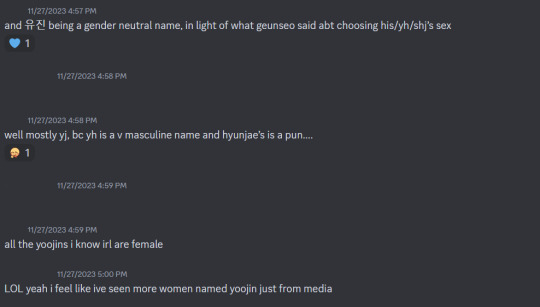
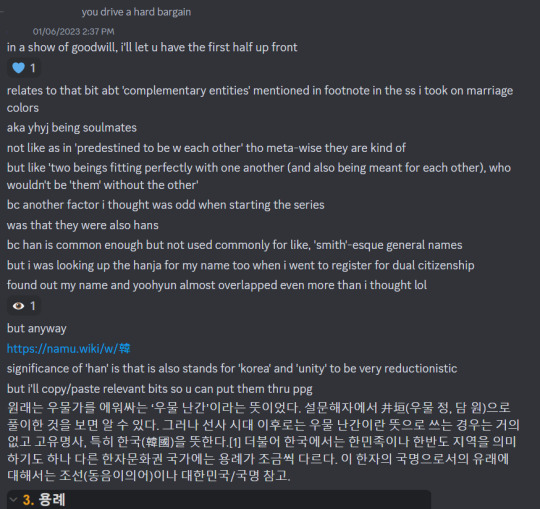
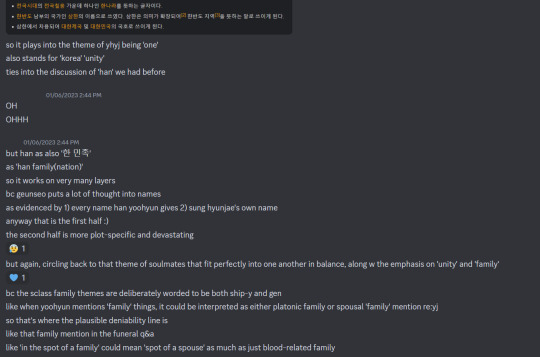
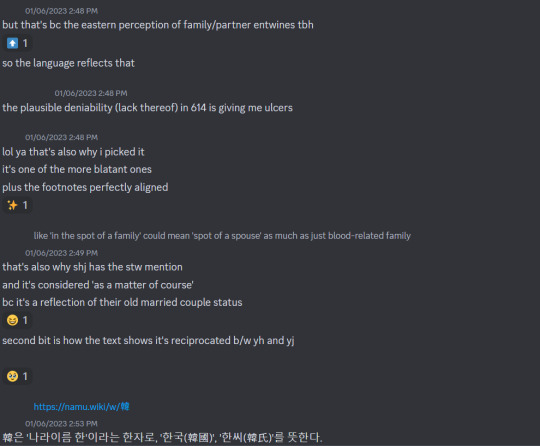
한 / Han


한이 담긴 우리의 도시, 서울 : 타블로(Tablo) & Joey Bada$$(조이 배드애스) - Hood [가사해석]
Han (cultural)
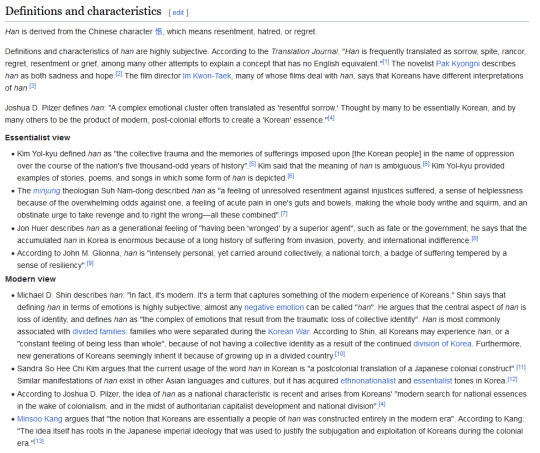
What's the meaning behind "Han" (한)?
Why Anyone Who Cares About Korea Should Watch “The Host”: Monster of Han, from the Han

Misc:
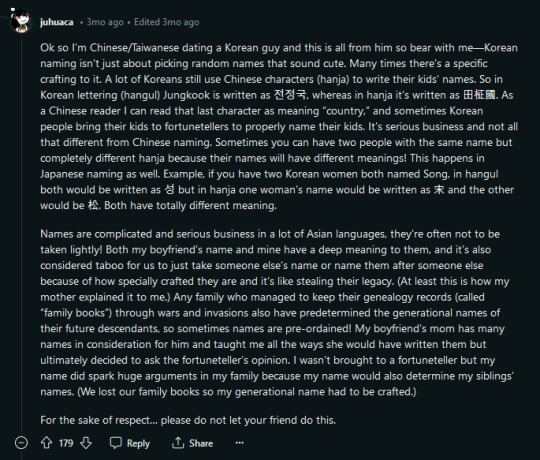
"Taemyung" or Korean fetus/belly baby names
Matchy sibsets and honour names-- cultural differences

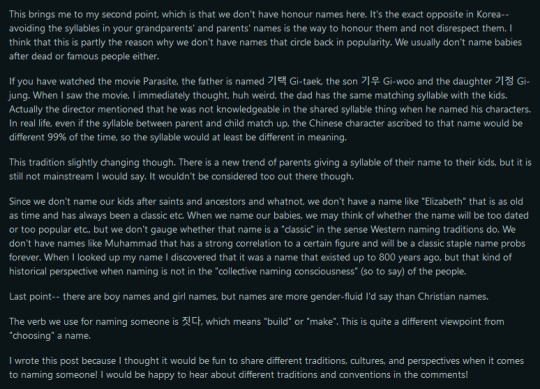
Understanding Korean naming customs.
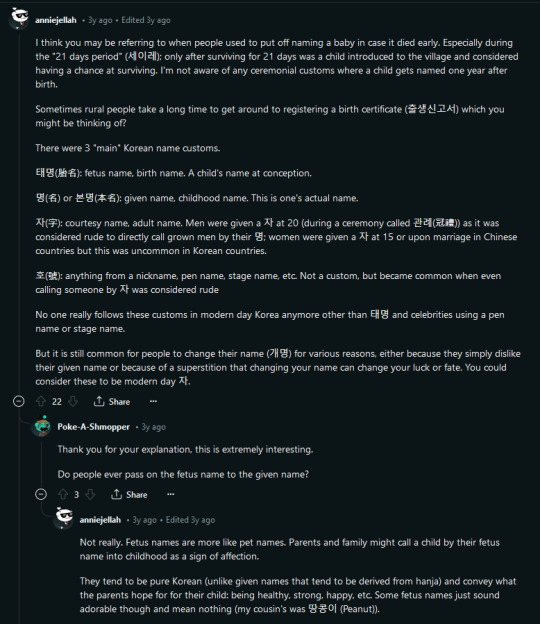
Korean generation name order.
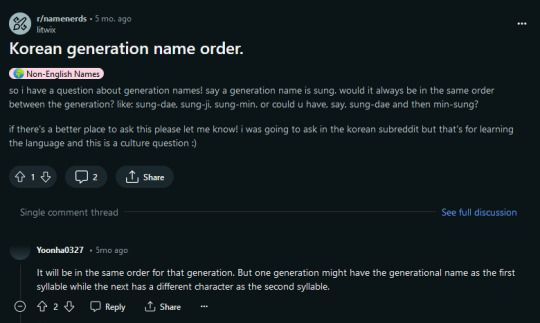
+
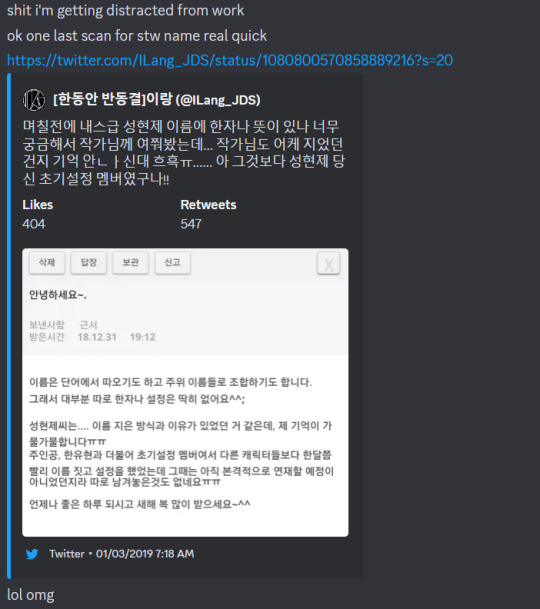
‘a few days ago, i got rly curious abt whether sclass’s sung hyunjae’s name had a hanja meaning or suchlike, so i ended up asking the author-nim abt it… author-nim responded that they didn’t recall how his name had come about (crying sounds)ㅠ…….. ah but more importantly, sung hyunjae, so you were a character included in the starting lineup, huh!!’ ‘the names are sometimes taken from words, or names i’ve encountered around myself. consequently, for the most part, they don’t tend to have a hanja root word or particular meaning attached to them ^^; in the case of sung hyunjae-ssi…. i feel as though there was a reason for the direction i took in naming him, but i’m afraid my memory regarding the matter is quite hazyㅠㅠ as he was one of the initial cast members, alongside the protagonist and han yoohyun, he received a name and had a backstory drawn up roughly a month prior to the other characters, but as i hadn’t intended on sitting down and making it into a full-blown series at that point, i hadn't left behind any notes on itㅠㅠ i wish you pleasant days, and happy new year's~^^
the author, looking up from their detailed explanation of ‘해연’: uhhh yeah, i didn’t really put much stock into shj bc he’s my deus ex machina dispenser and not han yoojin or han yoohyun, who the story is about,
30 notes
·
View notes